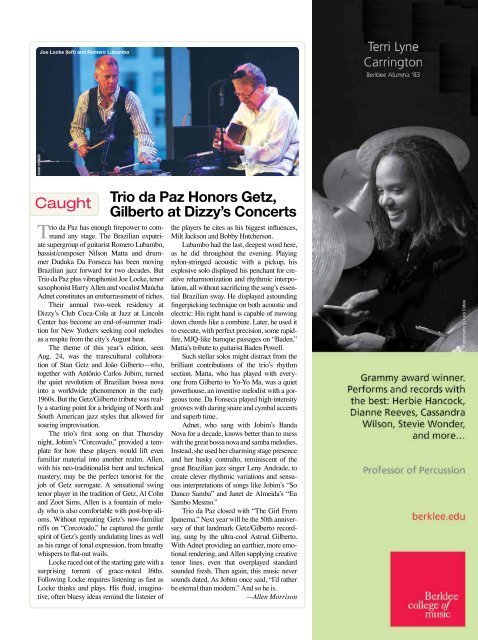Ron Carter Esperanza Spalding - Downbeat
Ron Carter Esperanza Spalding - Downbeat
Ron Carter Esperanza Spalding - Downbeat
You also want an ePaper? Increase the reach of your titles
YUMPU automatically turns print PDFs into web optimized ePapers that Google loves.
Joe Locke (left) and Romero Lubambo<br />
Frank Stewart<br />
Caught<br />
Trio da Paz has enough firepower to command<br />
any stage. The Brazilian expatriate<br />
supergroup of guitarist Romero Lubambo,<br />
bassist/composer Nilson Matta and drummer<br />
Duduka Da Fonseca has been moving<br />
Brazilian jazz forward for two decades. But<br />
Trio da Paz plus vibraphonist Joe Locke, tenor<br />
saxophonist Harry Allen and vocalist Maúcha<br />
Adnet constitutes an embarrassment of riches.<br />
Their annual two-week residency at<br />
Dizzy’s Club Coca-Cola at Jazz at Lincoln<br />
Center has become an end-of-summer tradition<br />
for New Yorkers seeking cool melodies<br />
as a respite from the city’s August heat.<br />
The theme of this year’s edition, seen<br />
Aug. 24, was the transcultural collaboration<br />
of Stan Getz and João Gilberto—who,<br />
together with Antônio Carlos Jobim, turned<br />
the quiet revolution of Brazilian bossa nova<br />
into a worldwide phenomenon in the early<br />
1960s. But the Getz/Gilberto tribute was really<br />
a starting point for a bridging of North and<br />
South American jazz styles that allowed for<br />
soaring improvisation.<br />
The trio’s first song on that Thursday<br />
night, Jobim’s “Corcovado,” provided a template<br />
for how these players would lift even<br />
familiar material into another realm. Allen,<br />
with his neo-traditionalist bent and technical<br />
mastery, may be the perfect tenorist for the<br />
job of Getz surrogate. A sensational swing<br />
tenor player in the tradition of Getz, Al Cohn<br />
and Zoot Sims, Allen is a fountain of melody<br />
who is also comfortable with post-bop idioms.<br />
Without repeating Getz’s now-familiar<br />
riffs on “Corcovado,” he captured the gentle<br />
spirit of Getz’s gently undulating lines as well<br />
as his range of tonal expression, from breathy<br />
whispers to flat-out wails.<br />
Locke raced out of the starting gate with a<br />
surprising torrent of grace-noted 16ths.<br />
Following Locke requires listening as fast as<br />
Locke thinks and plays. His fluid, imaginative,<br />
often bluesy ideas remind the listener of<br />
Trio da Paz Honors Getz,<br />
Gilberto at Dizzy’s Concerts<br />
the players he cites as his biggest influences,<br />
Milt Jackson and Bobby Hutcherson.<br />
Lubambo had the last, deepest word here,<br />
as he did throughout the evening. Playing<br />
nylon-stringed acoustic with a pickup, his<br />
explosive solo displayed his penchant for creative<br />
reharmonization and rhythmic interpolation,<br />
all without sacrificing the song’s essential<br />
Brazilian sway. He displayed astounding<br />
fingerpicking technique on both acoustic and<br />
electric: His right hand is capable of mowing<br />
down chords like a combine. Later, he used it<br />
to execute, with perfect precision, some rapidfire,<br />
MJQ-like baroque passages on “Baden,”<br />
Matta’s tribute to guitarist Baden Powell.<br />
Such stellar solos might distract from the<br />
brilliant contributions of the trio’s rhythm<br />
section. Matta, who has played with everyone<br />
from Gilberto to Yo-Yo Ma, was a quiet<br />
powerhouse, an inventive melodist with a gorgeous<br />
tone. Da Fonseca played high-intensity<br />
grooves with daring snare and cymbal accents<br />
and superb time.<br />
Adnet, who sang with Jobim’s Banda<br />
Nova for a decade, knows better than to mess<br />
with the great bossa nova and samba melodies.<br />
Instead, she used her charming stage presence<br />
and her husky contralto, reminiscent of the<br />
great Brazilian jazz singer Leny Andrade, to<br />
create clever rhythmic variations and sensuous<br />
interpretations of songs like Jobim’s “So<br />
Danco Samba” and Janet de Almeida’s “Eu<br />
Sambo Mesmo.”<br />
Trio da Paz closed with “The Girl From<br />
Ipanema.” Next year will be the 50th anniversary<br />
of that landmark Getz/Gilberto recording,<br />
sung by the ultra-cool Astrud Gilberto.<br />
With Adnet providing an earthier, more emotional<br />
rendering, and Allen supplying creative<br />
tenor lines, even that overplayed standard<br />
sounded fresh. Then again, this music never<br />
sounds dated. As Jobim once said, “I’d rather<br />
be eternal than modern.” And so he is. <br />
<br />
—Allen Morrison<br />
DECEMBER 2012 DOWNBEAT 19
















